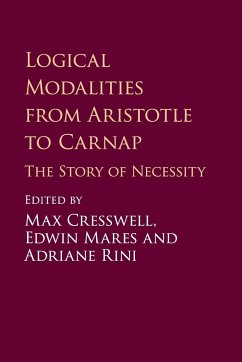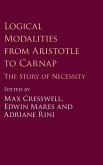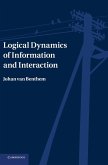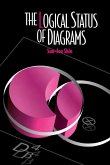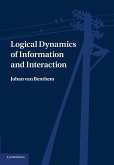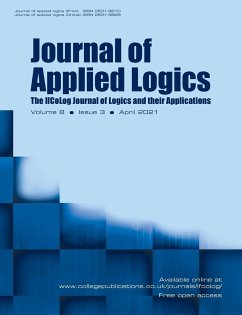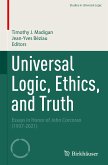Logical Modalities from Aristotle to Carnap
Herausgeber: Cresswell, Max; Rini, Adriane; Mares, Edwin
Logical Modalities from Aristotle to Carnap
Herausgeber: Cresswell, Max; Rini, Adriane; Mares, Edwin
- Broschiertes Buch
- Merkliste
- Auf die Merkliste
- Bewerten Bewerten
- Teilen
- Produkt teilen
- Produkterinnerung
- Produkterinnerung
Introduces readers to the history of necessity and possibility, two modal concepts which play a key role in philosophy.
Andere Kunden interessierten sich auch für
![Logical Modalities from Aristotle to Carnap Logical Modalities from Aristotle to Carnap]() Logical Modalities from Aristotle to Carnap123,99 €
Logical Modalities from Aristotle to Carnap123,99 €![Logical Dynamics of Information and Interaction Logical Dynamics of Information and Interaction]() Johan Van BenthemLogical Dynamics of Information and Interaction116,99 €
Johan Van BenthemLogical Dynamics of Information and Interaction116,99 €![The Logical Status of Diagrams The Logical Status of Diagrams]() Sun-Joo ShinThe Logical Status of Diagrams46,99 €
Sun-Joo ShinThe Logical Status of Diagrams46,99 €![Logical Dynamics of Information and Interaction Logical Dynamics of Information and Interaction]() Johan Van BenthemLogical Dynamics of Information and Interaction58,99 €
Johan Van BenthemLogical Dynamics of Information and Interaction58,99 €![The Lvov-Warsaw School. Past and Present The Lvov-Warsaw School. Past and Present]() The Lvov-Warsaw School. Past and Present107,99 €
The Lvov-Warsaw School. Past and Present107,99 €![Journal of Applied Logics - The IfCoLog Journal of Logics and their Applications Journal of Applied Logics - The IfCoLog Journal of Logics and their Applications]() Journal of Applied Logics - The IfCoLog Journal of Logics and their Applications24,99 €
Journal of Applied Logics - The IfCoLog Journal of Logics and their Applications24,99 €![Universal Logic, Ethics, and Truth Universal Logic, Ethics, and Truth]() Universal Logic, Ethics, and Truth106,99 €
Universal Logic, Ethics, and Truth106,99 €-
-
-
Introduces readers to the history of necessity and possibility, two modal concepts which play a key role in philosophy.
Produktdetails
- Produktdetails
- Verlag: Cambridge University Press
- Seitenzahl: 366
- Erscheinungstermin: 18. September 2018
- Englisch
- Abmessung: 229mm x 152mm x 20mm
- Gewicht: 530g
- ISBN-13: 9781107434905
- ISBN-10: 1107434904
- Artikelnr.: 54644739
- Herstellerkennzeichnung
- Libri GmbH
- Europaallee 1
- 36244 Bad Hersfeld
- gpsr@libri.de
- Verlag: Cambridge University Press
- Seitenzahl: 366
- Erscheinungstermin: 18. September 2018
- Englisch
- Abmessung: 229mm x 152mm x 20mm
- Gewicht: 530g
- ISBN-13: 9781107434905
- ISBN-10: 1107434904
- Artikelnr.: 54644739
- Herstellerkennzeichnung
- Libri GmbH
- Europaallee 1
- 36244 Bad Hersfeld
- gpsr@libri.de
Introduction Max Cresswell, Edwin Mares and Adriane Rini
1. Aristotle on the necessity of the consequent Adriane Rini
2. Aristotle on one-sided possibility Marko Malink
3. Why does Aristotle need a modal syllogistic? Robin Smith
4. Necessity, possibility and determinism in Stoic thought Vanessa de Harven
5. Necessity in Avicenna and the Arabic tradition Paul Thom
6. Modality without the Prior Analytics: early twelfth-century accounts of modal propositions Chris Martin
7. Ockham and the foundations of modal theory in the fourteenth century Calvin G. Normore
8. Theological and scientific applications of the notion of necessity in the mediaeval and early modern periods Jack MacIntosh
9. Locke and the problem of necessity in early modern philosophy Peter Anstey
10. Leibniz's theories of necessity Brandon C. Look
11. Leibniz and the lucky proof Jonathan Westphal
12. Divine necessity and Kant's modal categories Nicholas Stang
13. Charles Sanders Peirce on necessity Catherine Legg and Cheryl Misak
14. The development of C. I. Lewis's philosophy of modal logic Edwin Mares
15. Carnap's modal predicate logic Max Cresswell.
1. Aristotle on the necessity of the consequent Adriane Rini
2. Aristotle on one-sided possibility Marko Malink
3. Why does Aristotle need a modal syllogistic? Robin Smith
4. Necessity, possibility and determinism in Stoic thought Vanessa de Harven
5. Necessity in Avicenna and the Arabic tradition Paul Thom
6. Modality without the Prior Analytics: early twelfth-century accounts of modal propositions Chris Martin
7. Ockham and the foundations of modal theory in the fourteenth century Calvin G. Normore
8. Theological and scientific applications of the notion of necessity in the mediaeval and early modern periods Jack MacIntosh
9. Locke and the problem of necessity in early modern philosophy Peter Anstey
10. Leibniz's theories of necessity Brandon C. Look
11. Leibniz and the lucky proof Jonathan Westphal
12. Divine necessity and Kant's modal categories Nicholas Stang
13. Charles Sanders Peirce on necessity Catherine Legg and Cheryl Misak
14. The development of C. I. Lewis's philosophy of modal logic Edwin Mares
15. Carnap's modal predicate logic Max Cresswell.
Introduction Max Cresswell, Edwin Mares and Adriane Rini
1. Aristotle on the necessity of the consequent Adriane Rini
2. Aristotle on one-sided possibility Marko Malink
3. Why does Aristotle need a modal syllogistic? Robin Smith
4. Necessity, possibility and determinism in Stoic thought Vanessa de Harven
5. Necessity in Avicenna and the Arabic tradition Paul Thom
6. Modality without the Prior Analytics: early twelfth-century accounts of modal propositions Chris Martin
7. Ockham and the foundations of modal theory in the fourteenth century Calvin G. Normore
8. Theological and scientific applications of the notion of necessity in the mediaeval and early modern periods Jack MacIntosh
9. Locke and the problem of necessity in early modern philosophy Peter Anstey
10. Leibniz's theories of necessity Brandon C. Look
11. Leibniz and the lucky proof Jonathan Westphal
12. Divine necessity and Kant's modal categories Nicholas Stang
13. Charles Sanders Peirce on necessity Catherine Legg and Cheryl Misak
14. The development of C. I. Lewis's philosophy of modal logic Edwin Mares
15. Carnap's modal predicate logic Max Cresswell.
1. Aristotle on the necessity of the consequent Adriane Rini
2. Aristotle on one-sided possibility Marko Malink
3. Why does Aristotle need a modal syllogistic? Robin Smith
4. Necessity, possibility and determinism in Stoic thought Vanessa de Harven
5. Necessity in Avicenna and the Arabic tradition Paul Thom
6. Modality without the Prior Analytics: early twelfth-century accounts of modal propositions Chris Martin
7. Ockham and the foundations of modal theory in the fourteenth century Calvin G. Normore
8. Theological and scientific applications of the notion of necessity in the mediaeval and early modern periods Jack MacIntosh
9. Locke and the problem of necessity in early modern philosophy Peter Anstey
10. Leibniz's theories of necessity Brandon C. Look
11. Leibniz and the lucky proof Jonathan Westphal
12. Divine necessity and Kant's modal categories Nicholas Stang
13. Charles Sanders Peirce on necessity Catherine Legg and Cheryl Misak
14. The development of C. I. Lewis's philosophy of modal logic Edwin Mares
15. Carnap's modal predicate logic Max Cresswell.

